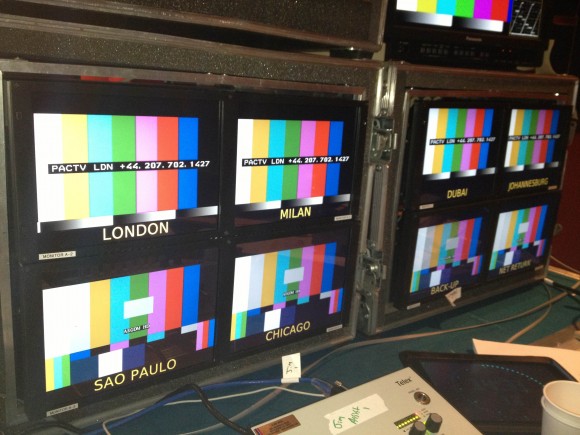Directing Multi-Lingual Television
Every once in a while I get a chance to flex my foreign language skills. Sure it does come in handy when you’re ordering from the menu of a Portuguese or Spanish restaurant, but in this global TV market being multi-lingual is a great plus.
Because of that, I’ve been able to work with many international networks and production companies. Brazil’s Globo, Mexico’s TVAzteca, MTV Tres, a Spanglish MTV network, and Argentine TV are but a few of those clients. I have also worked with Iranian, Pakistani, German, Turkish and Japanese networks, languages I don’t speak a lick.
Knowing the language is important but not imperative. I directed an hour long, rapid fire, Iranian talk show spoken in Farsi. I had no idea what they were saying, and I didn’t need to. Regardless of nationality, expression and inflection is basic to every language. An angry voice is angry regardless of the spoken tongue.
Facial expressions, head shakes, head nods are telling as to who agrees, disagrees, who likes who, who hates who or who has a question and is waiting for the opportunity to ask it. Visual and varying speaking volumes are cues as to where and to whom the conversation is going and being directed towards. I tend to keep an eye on the wide shot, looking for telling, subtle physical and auditory cues.
I was hired by Vision Quest Productions, a full-service provider for television production services, as a satellite coordinator on a global town hall meeting for a major investment industry client. Once a year the client brings together all of their major satellite offices from around the world. Dubai, Johannesburg, Milan, Sao Paulo, London, Chicago, were all set up for two way communication with New York, the meeting’s main origination. All sites were connected via satellite and/or fiber, with uplinks and downlinks at each individual location.
On a small scale, two-way communication can be served well enough with video teleconferencing, but when you’re globetrotting around the globe, a telephone line will not do the job. This job was big, so big that it took Vision Quest nearly 6 months to prepare for. They coordinated the satellite up and down links, location transmission, local crewing and any strategic parts associated with the production.
Each city had an uplink and a downlink for two-way communication between the location and New York City. Phone bridges were set up with individual locations for instant, pier-to-pier communication to dedicated lines for the Director, Producer and Engineer in Charge (EIC).
In addition to assisting in location satellite coordination, my main role in this production was to coordinate satellite services in Portuguese with Sao Paulo, Brazil, troubleshooting and remedying any potential problems that may arise. Milan, Italy was the only other location that had a dedicated person to handle any problems that necessitated an Italian speaking coordinator.
The only obstacle I encountered was the Portuguese nomenclature for broadcast terms. For the most part, basic technical terms are in English and understood by most international broadcasters, but when it comes down to specifics, like horizontal polarity, uplink and down link terms and individual’s titles, it can make you a little tongue-tied. English being such a widespread used language helps in situations like this where mixing English and Portuguese terms to get the message across sometimes is the only way to do it.
So after a seamless production and two days of flexing my language muscles, I once again put my multilingual skills into hibernation, and await the next call when I can blow off the dust and flex them once again.




